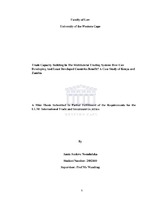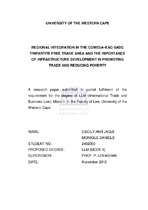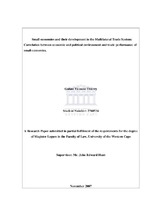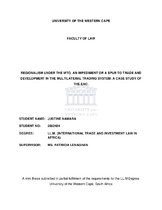Trade capacity building in the multilateral trading system: how can developing and least developed countries benefit? a case study of Kenya and Zambia
Abstract
The provisions of the General Agreement on Tariffs and Trade (GATT 1994) generally give favourable consideration to developing and least developed countries.1 Firstly, at the core of these provisions is the principle of special and differential treatment of these countries. As such developing countries are to meet their obligations under the WTO agreements as and when the special needs of their economies permit. The GATT 1994 provisions exempt least developed countries from participating in the obligations under the WTO agreements until such a time that they attain a reasonable level of development.Secondly, the Ministerial Meeting in Doha in November 2001 adopted a development agenda (that described capacity building activities as “core elements of the development dimension of the multilateral trading system”) and called for more co-ordinated delivery of trade related technical assistance and capacity building.2 In this regard, developed members of the WTO have committed to provide technical assistance to developing and least developed members in order to build their capacity to participate effectively under the WTO.The reality of the situation on the ground is that developing and least developed countries still face a lot of challenges which hinder their full participation and realization of the benefits under the multilateral trading system. It must be appreciated, at the same time that developing countries like China and India have been active and influential in the multilateral trading system, and additionally, their economies have and are experiencing overt growth. What
lessons does Africa need to learn from China and India?This study examines the causes of the poor performance of Sub Saharan Africa’s developing and Least Developed Countries in the multilateral trading system. In this regard, examples are drawn from two countries, namely, Kenya and Zambia.Further, the study examines the initiatives the WTO provides to enhance the trade capacity of its developing and least developed members. In addition, the study examines African trade capacity building initiatives such the New Partnership for Africa’s Development (NEPAD) and the African Capacity Building Foundation (ACBF) Initiatives, as well as the African Growth and Opportunity Act (AGOA) Initiative in order to establish how these initiatives can assist in enhancing the trade capacity of developing and least developed countries.The study further examines the role of regional trade integration in enhancing the trade capacity building of developing and least developed countries. In this case, examples are drawn from the Southern Africa Development Community (SADC) and the Common Market for Eastern and
Southern Africa-Developing Countries (COMESA). In this regard, the study concludes that fully-fledged regional integration has the potential to promote economic growth and industrial development in Africa.The study also demonstrates the importance of the participation of governments and the private sector in improving a country’s participation in the multilateral trading system. This study
particularly takes key interest in the crucial role of the public-private partnerships in enhancing competitive forces and competitiveness necessary to maximize trade opportunities, which in turn produces economic development.It is observed and concluded in this study that sustainably financed technical assistance and capacity building programmes have important roles to play in so far as integration of Sub
Saharan Africa into the global trading system is concerned; and that developing countries in general and LDCs in particular are to be provided with enhanced Trade-Related Technical Assistance (TRTA) and capacity building to increase their effective participation in the negotiations, to facilitate their implementation of GATT/WTO rules and to enable them adjust and diversify their economies.
Related items
Showing items related by title, author, creator and subject.
-
Regional integration in the COMESA-EAC-SADC Tripartite Free Trade Area and the importance of infrastructure development in promoting trade and reducing poverty
Daniels, Cecily-Ann Jaqui Monique (University of the Western Cape, 2012) -
Small economies and their development in the Multilateral Trade System: correlation between economic and political environment and trade performance of small economies
Thierry, Galani Tiemeni (University of the Western Cape, 2007)At the heart of this study is the topic of small economies in the Multilateral Trade System (MTS). The study examines the World Trade Organisation’s (WTO) legal framework and policy objectives in order to develop a ... -
Regionalism under the WTO, an impediment or a spur to trade and development in the multilateral trading system: a case study of the EAC
Namara, Justine (University of the Western Cape, 2009)This research paper pays particular attention to the EAC because of its unique composition of four LDCs46 and 1 DC47 and the fact that three of these countries are landlocked least developed countries (LLDCs).48 The EAC ...




